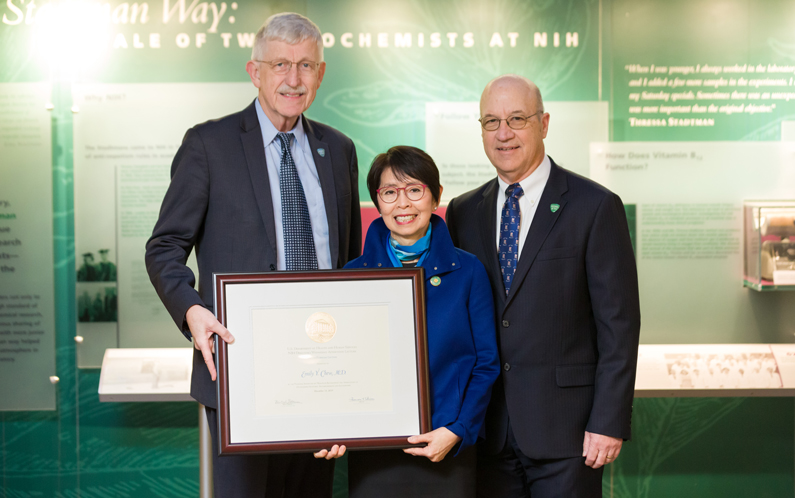Diet, supplements and AI: how can we prevent blindness?
Diet changes reduce macular degeneration in older adults by 25%

In December 2019, Dr. Emily Chew, Deputy Clinical Director of the National Eye Institute took the stage at the Wednesday Afternoon Lecture Series (WALS) Astute Clinician Lecture, delivering a talk with an intriguing title "We Are What We Eat: Nutrition, Genes, Cognition and Deep Learning In Age-Related Macular Degeneration."
Leading off with some figures, Chew stated that age-related macular degeneration (AMD) is the leading cause of blindness in the United States. There are three stages of the disease: early-stage where deposits build up in the eye and prevent oxygen and nutrients from reaching the retina but there is no loss of vision; intermediate where there may be mild vision loss, but most people don't experience any problems and late-stage where macular degeneration causes significant vision loss.
More prevalent than better known conditions such as cataracts or glaucoma, there are approximately two million older people with AMD and another eight million at risk for developing it. Globally it ranks as the third largest cause of impaired vision and blindness.
Research tends to demonstrate that diet affects overall health and dietary adjustments can be beneficial in reducing risk of certain diseases. Chew's team is studying the complex relationship of nutrition, diet and genetic makeup to measure their overall impact on susceptibility to macular degeneration.
NEI began its Age-Related Eye Disease Study (AREDS) study in the early 1990s, which included studying the effects of nutritional supplements on macular degeneration. According to the study, these nutritional elements resulted in a 25% reduction in progression from intermediate to late-stage AMD. An estimated 300,000 intermediate-stage patients may have benefited from slowing or halting their progression to late-stage AMD by adopting this treatment.
A new study, AREDS-2, continued the research by adding omega-3 content from fish and particular greens containing lutein/zeaxanthin (L/Z) to see if they had additional effect on slowing or halting late-stage AMD. The study found that fish oil had no effect and lutein content from greens had some effect. Additionally, lutein was found to be safer in reducing the risk of lung cancer that is often associated with the use of beta-carotene. The resulting AREDS-2 formulation substituted beta-carotene with lutein and became the recommend treatment for slowing the advance of AMD.
Long believed to reduce the incidence cardiovascular disease, NEI researchers then wanted to know if the Mediterranean diet would have any positive effect on AMD, and subsequent study indicated that it may help decreasing progressing from any stage of macular degeneration to the next. Additionally, the relationship of omega-3 and L/Z supplements to cognitive functioning was part of AREDS-2's scope – but these two supplements were found to have no harmful or beneficial effect on cognition.
Continued collaborative research arrangements showed there was a sevenfold increase in AMD when associated with certain chromosomes. Further, subtypes of the disease may have different genetic associations underlying different disease mechanisms. However, this complex genetic disease can be affected by multiple genes, and environmental risk factors such as smoking and diet also influence the diseases progression.
Chew's research did not find that genetic information was helpful in predicting the progression to vison threatening late stage AMD. Although genetic causation remains an active area of study, routine genetic testing is not currently recommended to determine the risk of developing the disease or for determining any treatments for macular degeneration.
Introducing AI
Chew next discussed how 'deep learning' – a subset of artificial intelligence (AI) –is being incorporated into detecting features of AMD based on actual clinical images, thereby assisting in classification and prognosis. Further, these results were compared to those obtained by retinal specialists, with deep learning outperforming the specialists in evaluating visually significant aspects of the disease. But the human specialists outscored deep learning in detecting and evaluating the late stage of the disease.
So what's the current relationship of computers and physicians as it impacts AMD? Chew believes AI will not replace live scientists in age-related macular degeneration research and treatment but will eventually enhance their diagnostic skills, allowing for more precise measurement and improved clinical management.
Looking ahead, Chew sees development of a preventive therapy for AMD as a possible outcome of this ongoing research.
"Deep learning can better detect and evaluate lesions that are not easily discernible to human experts," she stated. "But still many steps remain before implementing deep learning for care or research involving AMD patients."
- Robert Burleson